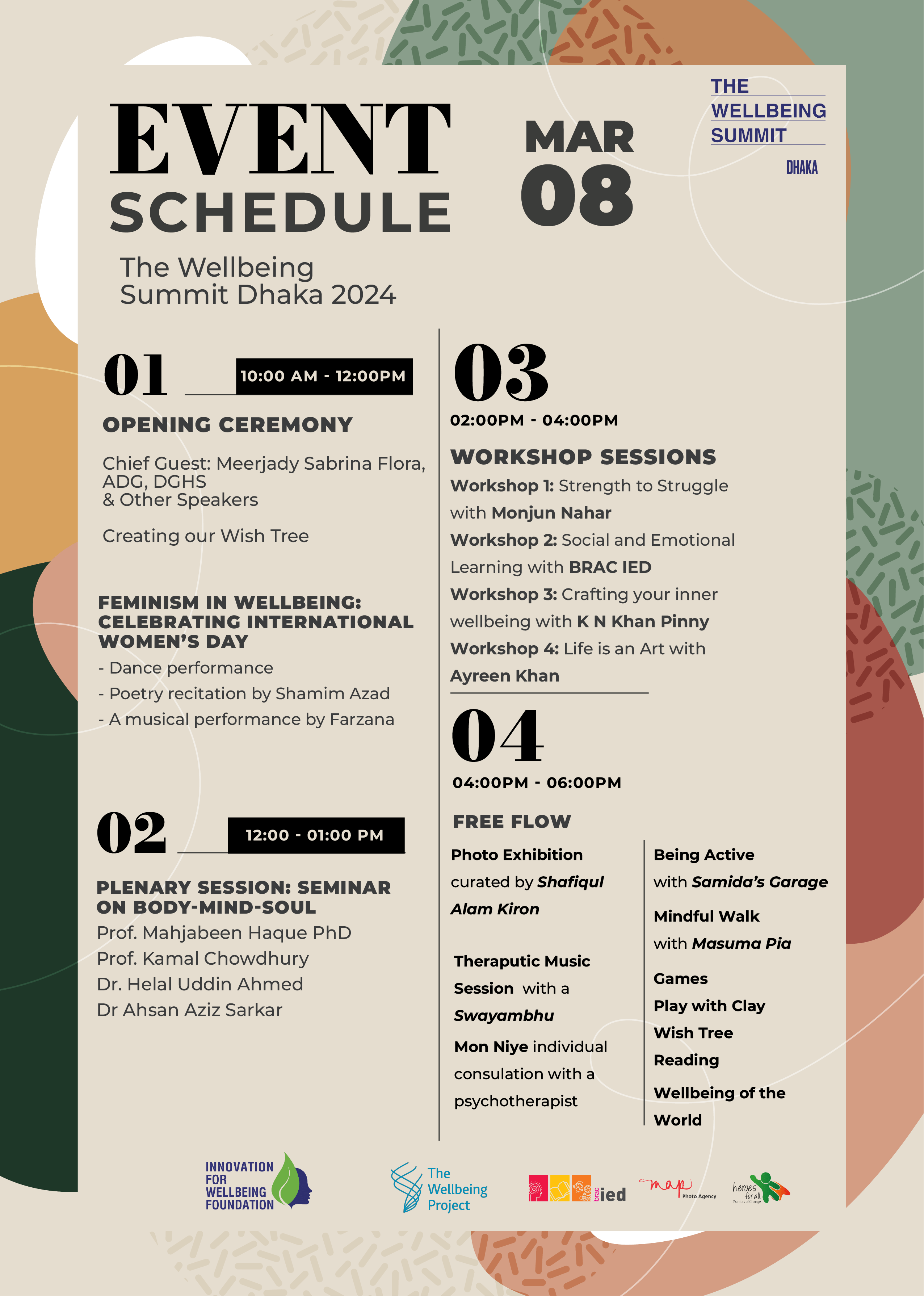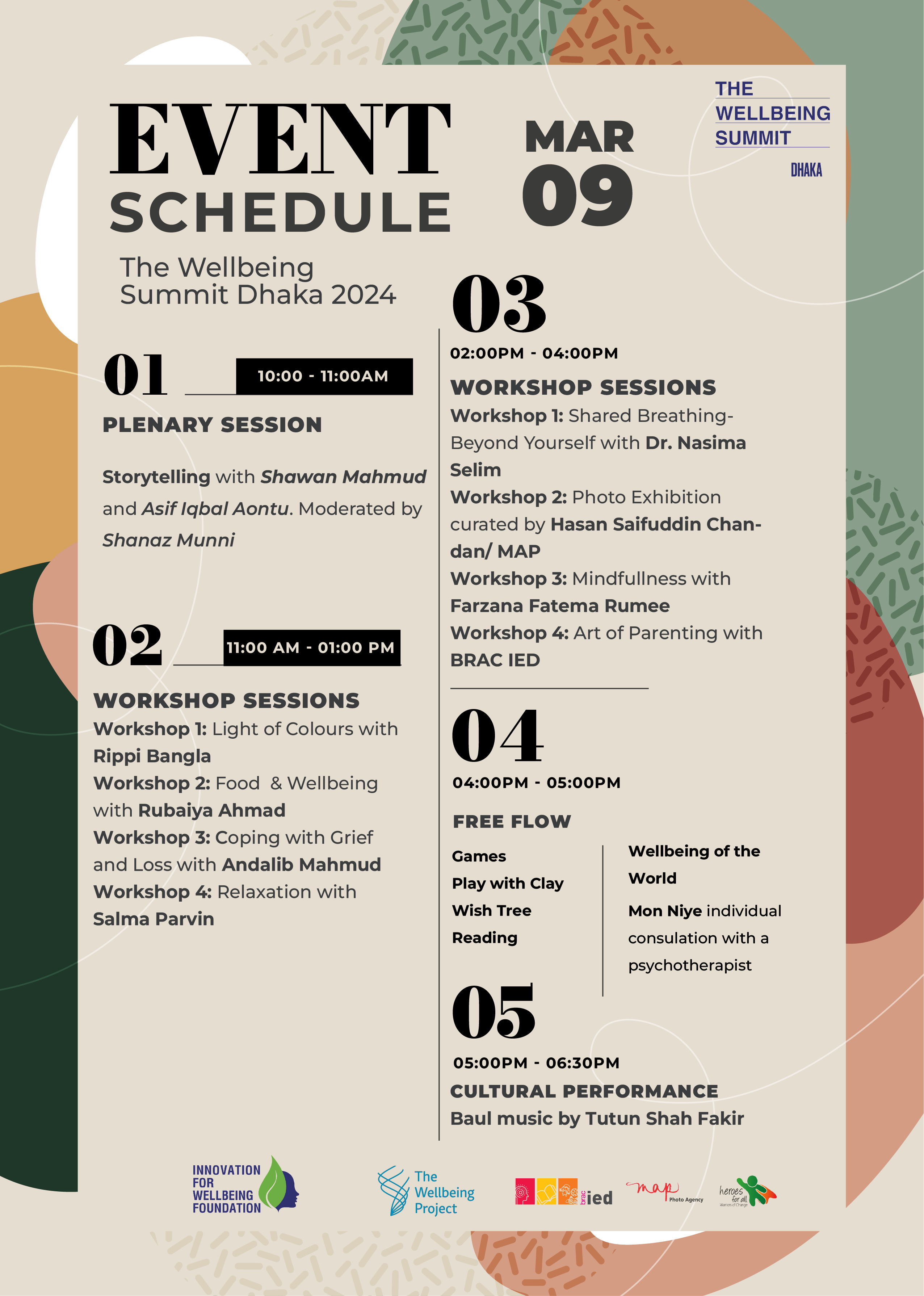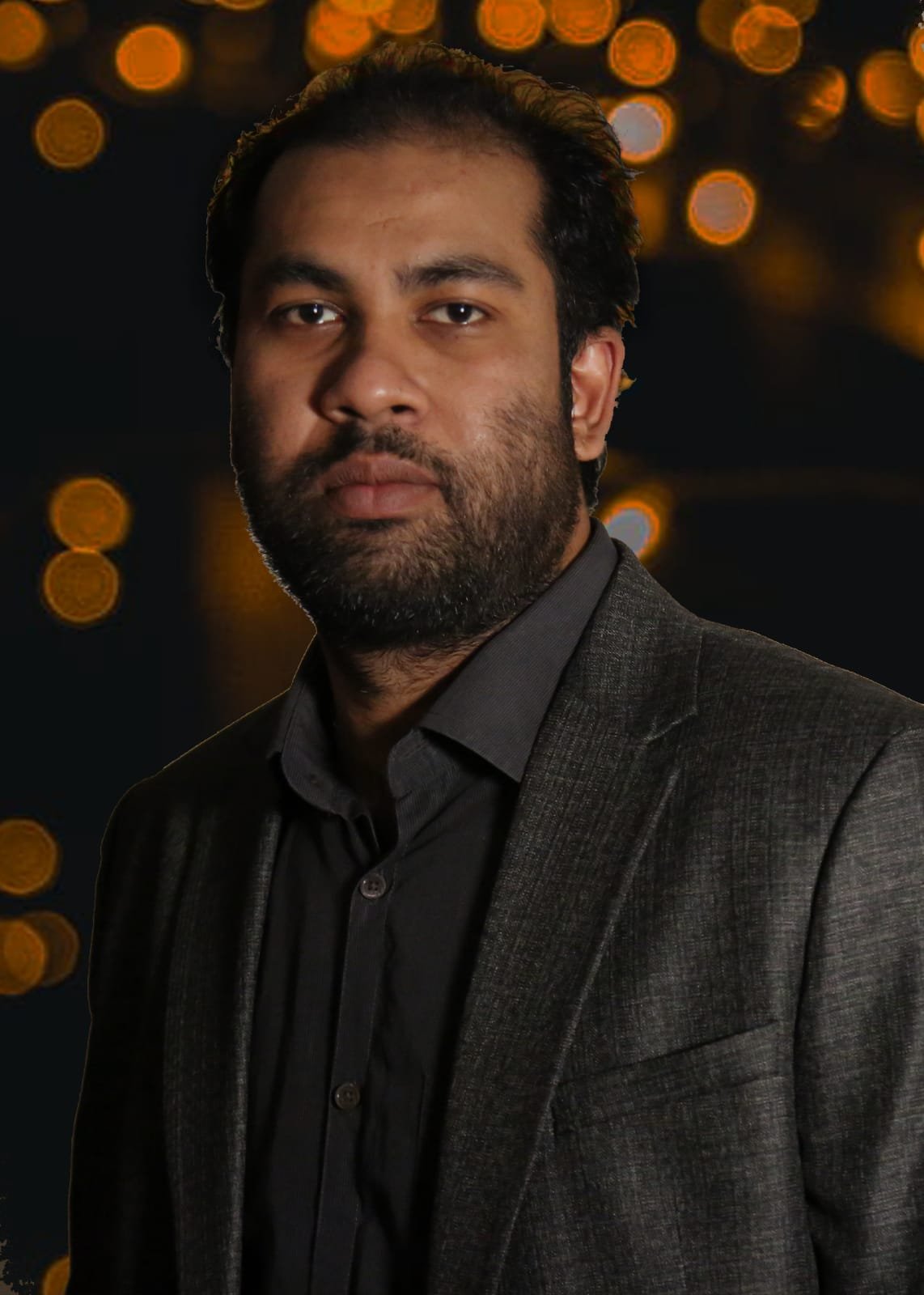
The Wellbeing Summit Dhaka 2024 The Wellbeing Summit Dhaka 2024
Regional Wellbeing Summits
ABOUT THE SUMMIT
“Projonmo theke Projonme: Generation to Generation”
Connecting land, language, and life: Bangladesh hosted the first regional Wellbeing Summit in Asia! The Wellbeing Summit Dhaka brought together 230 changemakers together over two monumental days to activate a culture of inner wellbeing in the local social change sector. With a driving focus to explore wellbeing for all – from Projonmo theke Projonme, or Generation to Generation – this exciting gathering convened diverse actors, creating a platform to enable transformative action in Bangladesh.
Changemakers were invited to join this transformative event which will help them connect their inner wellbeing with their work as actors for positive social impact. Inspiring talks, storytelling, the arts, therapeutic workshops, and classic chayer adda – tea-time talks – insightfully explored themes such as feminism, financial wellbeing, human flourishing, nutrition, and intergenerational trauma. Attendees were able to practice a diverse range of activities to activate their inner development and wellbeing. A compelling arts programme also invited them to approach these topics through the emotional and intellectual language of the arts. The Wellbeing Summit Dhaka share a common message: if we can ensure wellbeing, we can perform better – because wellbeing inspires welldoing.
Connecting the Land, Language, and LifeConnecting the Land, Language, and Life
Relive the Spirit of the Summit
DAY 1 Highlights
DAY 2 Highlights
TWO DAYS, ONE CENTRAL FOCUS TWO DAYS, ONE CENTRAL FOCUS
Explore the programme
How Do We Reach Wellbeing for All, From Generation to Generation?
The programme took changemakers on a journey between individual and collective wellbeing, exploring themes such as:
- Feminism, gender equality, and gender-based violence
- Intergenerational trauma in Bangladesh, including historical trauma from the 1971 Liberation War
- Cultural celebration and preservation
- Childcare and parenting
- Rest, relaxation, and healing
- Physical health, nutrition, and exercise
- The national Special Initiative for Mental Health
Projonmo theke ProjonmeProjonmo theke Projonme
EXPLORE STORIES FROM THE SUMMIT
A Special Celebration of Feminism
The Wellbeing Summit Dhaka opened on International Women’s Day, bringing a special celebration of feminism to the event. Sessions and art performances reflected on women’s empowerment and the role of women in Bangladeshi society. Delegates were also invited to wear quinsentially Bangaldeshi sarees in purple, the color of Women’s Day, to mark the occasion.
The theme of celebrating feminism also extended a tribute to Mother Earth, with the entire event designed sustainably. Hand-made, upcycled, and second-hand materials — including banners and ribbons made from the cloth of recycled sarees — all of which were designed for circularity, decorated the lush green setting of Bangla Academy, inviting an down-to-earth atmosphere to the gathering.


KEY SPEAKERS & ARTISTS KEY SPEAKERS & ARTISTS
THE WELLBEING SUMMIT DHAKA THE WELLBEING SUMMIT DHAKA
In The News
Read and watch local coverage of the first Regional Wellbeing Summit in Asia.
HOSTED BY
Innovation for Wellbeing Foundation
WITH SPECIAL THANKS TO THESE GENEROUS SPONSORS, FUNDERS, AND PARTNERS
4MTV USA, BRAC University, Heroes for All, Liberty Media Group, MAP Photo Agency, Quazi Consultants, and The Wellbeing Project
CONNECT WITH TWBS DHAKA
Don’t miss a beat! Stay up-to-date with The Wellbeing Summit Dhaka.
FOLLOW AND JOIN OUR JOURNEY!
MORE REGIONAL SUMMITSMORE REGIONAL SUMMITS
Discover the Wellbeing Movement in AsiaDiscover the Wellbeing Movement in Asia
Meet and hear stories from the changemakers championing the wellbeing movement in Asia.

Untitled Untitled
By Members of our Wellbeing in Higher Education Network community
Daniel, Lisa, Jara, Rosalinda, Tania, Mac, and Ken


Cultivating a Thriving Inner Landscape Where Our Potential Can Bloom: 7 Learnings on How Mental Health Helps Achieve Social Change and PeacebuildingCultivating a Thriving Inner Landscape Where Our Potential Can Bloom: 7 Learnings on How Mental Health Helps Achieve Social Change and Peacebuilding
Growing up in Colombia, a country with an armed conflict, filled with bombings, massacres, and displacement, I always felt the need to heal our wounds of violence and work towards the construction of peace. Fundación Mi Sangre, co-founded with songwriter and singer Juanes, has been my primary vehicle for pursuing this purpose. Since 2006, Mi Sangre has played a pivotal role in fostering systemic cultural change in Colombia by involving youth and the actors surrounding them as key contributors to personal, community, and systemic transformation. This model equips participants with life, leadership, and entrepreneurial skills, empowering them to co-create positive changes in their communities, including solutions towards peace.
Our work encompasses a multifaceted vision of leadership, emphasizing the development of both individual and collective skills. It involves nurturing awareness, empathy, critical thinking, and curiosity while fostering collaboration. We address the challenges young people face due to living in impoverished and violent environments, providing comprehensive mental health support as a valuable resource for personal and collective transformation. With this emphasis on inner work, mental health, and wellbeing, we have seen positive results not only in our participants’ lives but in the systems all around us.
From more than 15 years of service to young people in Colombia, here are some of the lessons from our journey that have now become integral to our work.
1. We can support the individual through the collective.
In dealing with trauma and other mental health challenges, some specific cases require individual psychosocial support. However, our organization and country lack the resources to provide it individually at scale. Therefore, we have integrated mental health skills into leadership programs, to offer support in a collective setting while integrating a preventive approach. These programs blend self-discovery and introspection, with safe spaces, fostering social connections and a sense of belonging. The mental health dimension of our leadership programs holds a special place in the hearts of our participants. From our retreats, I recall with emotion their warm hugs, the tears of healing they shed, and the laughter that set their spirits free, all within the safe space we helped create for them.
2. Holistic wellbeing – connecting mind, heart, body, and spirit – is essential.
Our programs prioritize a holistic approach encompassing the mind, heart, body, and spirit. Engaging the mind fosters critical thinking, self-awareness, and informed decision-making. Emotional aspects, represented by the heart, nurture empathy and meaningful relationships. Physical well-being, supported by the body, ensures energy and vitality, offering valuable wisdom through a strong mind-body connection. Nurturing the spirit, which encompasses purpose and resilience, provides inner strength to face challenges. Collectively, these dimensions empower individuals to lead authentically, while achieving significant change. Our young participants have successfully created more than 1,800 change initiatives, achieving profound systemic transformations in areas such as violence prevention, reconciliation, gender equity, migrants’ inclusion, and prevention of forced recruitment to armed groups.
3. The creative arts and nature are our biggest allies.
Creative arts and nature are central to our programs. We offer creative outlets like painting, music, and writing to serve as therapeutic outlets, hellping to alleviate stress, anxiety, and depression. Art encourages mindfulness, fostering social connections and deep interactions. Simultaneously, nature provides purpose and tranquility and teaches the vital concepts of oneness and interconnection. Whether it’s a simple walk in the park, incorporating plants, or outdoor experiences in natural settings, these holistic approaches significantly enhance our program’s effectiveness. My heart fills with gratitude when I remember a participant who shared that she had discovered the wisest counselor in nature and had never received such profound guidance from anyone else.

Credit: Fundación Mi Sangre/Alejandro Bonnells

Credit: Fundación Mi Sangre/Alejandro Bonnells
“My heart fills with gratitude when I remember a participant who shared that she had discovered the wisest counselor in nature and had never received such profound guidance from anyone else.”
4. Mental health and wellbeing have to be cultivated.
From our community engagement, it is clear to us that mental health and wellbeing are not static conditions; they are cultivated over time through a combination of self-awareness, self-care, and positive life choices. To help our communities make these choices, we have developed several strategies, including an open-source library with tools and resources, along with trainer approaches and curriculums for parents and educators, on how to develop 17 different holistic leadership skills. To our surprise, this library, originally created for our team, has more than 2,500 visitors per month, demonstrating its regular use. We also don’t limit our mental health support to our participants: since the pandemic, our full team holds weekly online meetings to share various practices, encouraging us to lead by example and embody the change we want to be in our communities.
5. We must shift paradigms around mental health.
Transforming mental health paradigms is a crucial piece to this puzzle, given historical stigma that discourages those who are struggling from seeking support. To help change this dynamic, we have launched grassroots and national campaigns at Mi Sangre to normalize mental health discussions, emphasizing the importance of open, empathetic, and non-judgmental conversations. Recognizing that change starts at the individual and community levels, we are committed to creating tailored approaches to mental health, considering differences in ethnicity, gender, and age while incorporating local wisdom. We also seek to expand the dialogue on mental health to include wider audiences: inspired by the Wellbeing Summit for Social Change in Bilbao, we co-created the Wellbeing Summit Bogotá in September 2023. Mental health was a central topic at this event, which convened changemakers from the social change, business, academic, and public sectors. We aspire to extend this initiative to other Latin American cities, further advancing this crucial agenda for mental health.


An example of posters co-designed with local communities, written in Nasa Yuwe, the language indigenous communities of Toribio, Norte del Cauca, Colombia, with an invitation to reach out to mental health support services. Literal translation: “Weaving the good life. Mental health is harmony, source of inspiration and wisdom”. Credit: Fundación Mi Sangre/Alejandro Bonnells
6. Our personal journeys influence our professional work
Leading Mi Sangre has been a profoundly personal journey.My pursuit of inner growth and wellbeing commenced 18 years ago after facing burnout during my first venture. However, this journey evolved recently when I developed a deeper understanding of trauma’s impact on my work, through participation in the Inner Development Program by The Wellbeing Project. In a retreat with fellow change agents, I was transported back to a poignant childhood memory. I overheard the tragic fate of our neighbors, the parents of children my age who were kidnapped and brutally murdered. The re-emergence of this memory unleashed profound emotions, revealing the lasting impact it had on me. This experience unveiled the roots of certain unhealthy patterns in my entrepreneurial drive – a fear of losing what I cherish, an unconscious drive to do everything to survive and protect my loved ones, and a limiting belief that I must accomplish everything now because tomorrow is uncertain. I have undergone profound transformations as a result. When leaders embark on deep explorations of their inner selves, a much deeper layer of meaning emerges about who we are, what we do, how we pursue it, and, more importantly, how we want to pursue it. I have witnessed numerous stories of leaders similarly elevating their modes of operation (and impact!) by embarking on journeys of inner work.
7. Inner work can help heal systems.
In the pursuit of positive social change and lasting peace, inner work stands as a pivotal force that transcends individual growth to mend the very systems that have been fractured by violence and turmoil. The power of inner work is not confined to self-discovery and personal development; it extends to our collective consciousness and societal structures. Mi Sangre’s work involves weaving ecosystems, bringing together a wide array of participants from the public, private, and third sectors – sometimes even including former enemies and victims – to co-create solutions. Through our methodologies, we have witnessed the potential to transcend differences, hate, and fear in order to act collectively towards peace. By delving into the depths of our inner selves, we unearth the empathy, resilience, and wisdom required to reshape these systems.
“By delving into the depths of our inner selves, we unearth the empathy, resilience, and wisdom required to reshape these systems.”
Both through my work and personal experience, I’ve learned to embrace pain and struggles as inherent aspects of life. However, I’ve also seen the potential for leading a life filled with profound meaning, even in the face of persistent challenges. Equipping leaders with the skills to address trauma, support their mental health, and enable wellbeing is essential. In doing so, we are able to help them cultivate resilience, enabling them to reach their highest human potential, foster healthy relationships, and serve life with freedom and joy.
Looking back at the dream Juares and I had 16 years ago – working towards peace – I am convinced that including inner work in our systemic approach has been pivotal in catalyzing extraordinary leadership. Without it, we may have never been able to advance the reconstruction of our social fabric, influence decision-makers, and help heal systems that impact over 2 million people who have undergone profound transformations toward peace-building and social change. I invite you to explore how mental health, healing, and inner work may transform your work in social change – with a thriving inner landscape, there’s no limit for our how our potential can bloom.
About the authorAbout the author

Meet Catalina Cock Duque
Catalina Cock Duque, a seasoned catalyst for systemic change with over 25 years of experience, is a passionate leader in sustainable development, peace-building, and social impact. Distinguished as a Young Global Leader by the World Economic Forum and recognized by Silla Vacía in Colombia, she co-founded Fundación Mi Sangre, impacting over 2 million people in Colombia. As a Co-Founder of Oro Verde and the Alliance for Responsible Mining, Catalina played a pivotal role in establishing the first global certification for artisanal gold mining, expanding its reach to over 10 countries. She holds a BA from the University of Maryland and a Master’s from the London School of Economics, complemented by executive courses in leadership and innovation from top institutions worldwide.
Hear from Catalina's experience on taking part of The Wellbeing Summit Bogotá: Hear from Catalina's experience on taking part of The Wellbeing Summit Bogotá:

Defenders’ Wellbeing Collective
The Defenders’ Wellbeing Collective holds a space for leaders of grassroots, community, and survivor-led human rights organizations to reflect, experiment, share, and learn together about how best to support greater wellbeing and resilience within their organizations.
Wellbeing in West Africa: How We Gather TogetherWellbeing in West Africa: How We Gather Together
Guest post by:
Carina Ndiaye, Chief Partnerships Office, Tostan
In Senegal, we call it Teraanga. It stands for openness and sharing, meaning: “we invite you to come in.” This cultural norm is present throughout the region and across the continent. Words like Ubuntu in southern Africa portray acknowledgment, respect, and coexistence. In Senegal, through Teraanga, the concept behind the Hindi word Namaste (meaning: “the light in me sees the light in you”) is extended and reinforced to say, “what is mine is yours.” This applies not only materialistically but also to the earth, the sun, the sea, and the unseen. From visitor to member, from transitory to influenced, in our culture, the ‘you’ never stands alone. What affects you also affects me and my community, and community includes anyone who walks our way and crosses our path.
As Tostan agreed to host the first African Wellbeing Summit, joining The Wellbeing Project and key partners hosting similar summits around the world, Teraanga has been a foundational concept for us. It is an entry point into the broader West African cultural systems that value people and their shared history and interconnectedness and that prioritize interdependence over independence.
Our upcoming African Regional Wellbeing Summit Dakar-Thiès 2023 reflects our dedication to embracing community-centered models that resonate with our core values. Locally-driven initiatives and capacity development for communities are critical paths forward, as our CEO Elena Bonometti has pointed out. But at the heart of our vision is Teraanga, where openness and sharing guide us in meeting the multifaceted challenges that our world faces. In Senegal, when challenges arise, a community gathering – referred to as a “pénc” in Wolof – is called to bring together the community for discussion. The Summit will be a globally-connected pénc, embodying the essence of African-based, African-led collaboration and growth in wellbeing. This is not just a “nice to have”; it is essential to our collective wellbeing and social cohesion.
There is a deep respect here for where people come from and for who and how they are. Many traditions create space for people to be seen, acknowledged, and recognized. Through greetings, names, joking, showing respect, and almost countless ways of engaging, we witness and reinforce one another. We see more clearly the threads interweaving our collective well-being. These traditions aren’t technical solutions or abstract topics; they are ways of meeting and gathering together, of creating spaces and openings where we can understand one another, share our perspectives and passions, and work better together.
With over 32 years of experience as a Senegal-based organization, welcoming partners from more than 50 countries far beyond Africa’s border, at our Tostan Training Center, we have come to understand that these ways of welcoming, these traditions for creating space, for seeing and being seen, can be powerful. As our global community seeks to find ways to support increased wellbeing in a context of increasing urgency and challenge, we hope our African Regional Wellbeing Summit Dakar-Thiès 2023 can contribute and share these ways of coming together.
Through our collaborative planning for the Summit, we have found some important themes to explore together. These include mental health, digital wellbeing, wellbeing in the workplace, and others. But the success of our conference won’t be limited to topics, action plans, or best practices. It will also depend on how people feel when they leave, how they can sustain connections, and whether they have found some new ways of inviting change into their lives, their organizations, their work, and our world.
About the African Regional Wellbeing Summit in Dakar and Thiès, Senegal
Join us for the first African Regional Wellbeing Summit in Dakar and Thiès, Senegal, hosted by Tostan from November 29th to December 1st, 2023.
The Summit will be an opportunity to engage in workshops, panels, and social moments to explore wellbeing, especially for those working in service for community-led development, from diverse African perspectives. Discover themes including mental health and its impacts on wellbeing, the role of religion, youth, and digital health.
Four Seasons Under One Sky: Arts as a Collective Approach to Creativity and Healing in South Africa Four Seasons Under One Sky: Arts as a Collective Approach to Creativity and Healing in South Africa
Guest post by:
Marlize Swanpoel
Co-Founder & Director, sp(i)eel arts therapies collective (Cape Town, South Africa)
sp(i)eel is an arts therapies collective (including drama, music, dance/movement, and art) of arts therapists, applied arts practitioners, and arts activists addressing intergenerational and complex trauma in South African communities. Over two centuries of colonialism and the oppressive regime of apartheid has left a nation grappling with systemic inequity and intergenerational trauma. Ongoing poverty and high incidences of violence and crime coupled with a dire lack of mental health services are contributing to complex and ongoing trauma, with more than a quarter of South Africans suffering from probable depression (Craig et al, 2022). This mental health crisis our country is facing is a systemic issue, not an individual one, and it needs a collective response. Our approach to mental health is culturally informed and sees people as each other’s greatest resource and source of support. As a result, our ultimate goal is to develop collective resilience that can affect social change.
Our name, spieel, is derived from two words that have different meanings in the Afrikaans language: “to play” or “mirror”. To “play and mirror” speaks to several reasons for our use of art as a healing tool. It refers to the function of the arts as a mirror to society for expression, reflection, and understanding. It also speaks to the therapeutic aspect of art therapies, where an art form is applied as a mirror to Self for exploration and understanding. Furthermore, it is through the playful nature of the arts that we can connect with our innate creativity.
It also speaks to the therapeutic aspect of art therapies, where an art form is applied as a mirror to Self for exploration and understanding.
In South Africa, access to therapeutic arts programmes is limited and not accessible to everyone. We aim to enable accessibility to the intentional use of various art forms to further have a positive impact on general health, wellbeing, development, and transformation for all.
Given our deep connection with the arts, our story and impacts can best be shared visually. This photo essay illustrates the journey of healing and wellbeing experienced through our Families and Collective Futures programme. It is a resilience-focused, trauma-informed programme that applies the arts and creativity to build psychosocial support systems. These systems are created through research (in collaboration with Brunel University), training, and the implementation of arts-based groups for children and their social circles.
The journey of this programme is presented within the frame of one of our core guiding metaphors: the four seasons. It represents the following. Firstly, just like the seasons, our mental health and wellbeing are not in a fixed state. We experience constant ups and downs. By accessing tools such as embodied awareness, reflexivity, and regulating skills, we can support ourselves and each other to navigate through these seasons of illness and health.
Secondly, this metaphor understands mental health and wellbeing in the context of the ecosystem. Communities are made up of people in different seasons of life. Collective resilience implies that the pressure to bounce back from hardship is not the sole responsibility of the individual. When one person suffers, it affects everyone. Everyone plays a role in collective health; as a collective, we are stronger together.
Collective resilience implies that the pressure to bounce back from hardship is not the sole responsibility of the individual. When one person suffers, it affects everyone.
Lastly, the seasons mirror people’s relationship with nature, and offer a platform to reflect on cultural and indigenous knowledge embracing nature as a source of healing.
We begin our journey in the season of (re)birth: Spring.
SPRING SPRING
Tending to the Soil So the Seedlings Can Thrive

In a community workshop, participants create an embodied image of Spring. A healing-centered approach to intergenerational trauma in family systems involves the adults developing reflective and regulating skills to take care of their own mental health, so that they are better aware of unhelpful patterns of relating in their families and community.

Arts activist Gershan Lombard facilitates a ritual of gratitude at the end of a community workshop, with the small children keeping a close and curious eye. Culturally-informed psychosocial practice includes honouring indigenous knowledge and spiritual practices of health and wellbeing to share this wisdom with the next generation.
Summer Summer
Young People’s Shining Stories

A group of young women share their story about Summer as a starting point to explore themes of health and wellbeing. It is vital to offer young people multiple ways to share their thoughts and feelings, as words are not always readily available to express their inner worlds. As one participant (grade 11, high school leaner) revealed to us:“You might have noticed that we are a generation that keeps to ourselves, and we don’t trust anyone with our feelings and our thoughts. Especially because we don’t know how to talk about our feelings and our thoughts. You have come to show us that we can also show you through our songs and through our dances how we feel and what we are thinking. And that is freedom.”

A young woman creates her “Glimmer Box”, a tool that supports participants to explore what resources are available to them to support their mental health and wellbeing. These include positive relationships, safe spaces, and activities that regulate their emotional states. Some of these are drawn, painted on stones, or represented by found objects in nature and placed in the box as tangible reminders of available support systems.
“You have come to show us that we can also show you through our songs and through our dances how we feel and what we are thinking. And that is freedom.”
Autumn Autumn
A Season of Trust and Letting Go

A couple rests back-to-back and connects with each other’s breath. Our embodied, trauma-informed practice is drawn from Stephen Porges’ Polyvagal Theory as a way to understand the autonomous nervous system’s responses. This helps us understand our reactions to triggers and to develop tools for regulating and finding safety and connection in the present moment. The couple shared afterwards: “My partner and I are having difficulties in our relationship. This workshop has given us the space to sit and just be with each other, to re-connect, and we were able to talk about things. This had a positive influence on our children and family life.”

In a workshop for mothers and daughters, mothers embody the support of a bridge, coming together to keep a girl above water. This workshop took place during a time of heavy flooding in the area in which some participants had lost their homes. This role-playing offered a way to express the traumatic experience: “The only way to keep safe is when we all look after each other’s children. We are not alone in this world, and your child is my child,” shared one mother. The embodied work where non-verbal communication is encouraged also supported bonding between mothers and daughters: “Girls don’t open up to parents, this exercise helped us to open up to each other,” said a young participant.
“We are not alone in this world, and your child is my child.”

A group embodies the word “women” in Circles of Support, one of our workshops for women. This workshop explores the female menstrual cycle as its four phases are linked with the four seasons, inviting conversations around menstrual and sexual health, menopause, and mental health and wellbeing. These circles are filled with generational knowledge, beauty, hope, and wisdom. One participant expressed her joy: “My experience was that I can be comfortable with myself as a woman. And I can express my feelings and accept my body. To be a woman is great!
Winter Winter
Embracing the Wisdom of the Elderly

A whole community, including the elderly, adults, youth, and children, are enchanted by a storytelling circle. We witnessed a beautiful moment where the children sat and listened to the stories of the elderly, and asked them questions about the history of their community. Such events where the stories of the elderly are centralized, offer a means to narrate collective and cultural history to the next generation.

Elderly men create their own Glimmer Maps to identify their “glimmers”: small moments when we are in a place of connection or regulation, which cues our nervous system to feel safe or calm – the opposite of triggers. They are made by tracing a hand on paper, followed by a symbol of nature representing the Self drawn into the palm. Each finger represents a glimmer with prompts from nature, for example: air for breath, fire for warmth, love, comfort and rest, water for movement, and earth for grounding. Finally, we connect the glimmers to our community, and include the name of a person who makes us feel safe.
Concluding Concluding
One Cycle, Inspiring Another
A core element of the Families and Collective Futures programme is the creative methodology. One participant reflected that the manner in which we engaged with them has helped people to come out of their shell, as “ons mense neem nie maklik deel nie” (“our people do not engage easily”). To help ease our participants out of these shells, we understand several contributing factors help create a sacred and safe space where mental health and wellbeing can be addressed:
A scaffolded approach to introduce arts-based work;
The invitation to engage in any way that feels comfortable;
The knowledge that attendance is voluntary; and
The modeling of respect, tolerance, and kindness.
The above learnings speak to a healing-centered approach to trauma and essentially it is a message of hope. When we work within the ecosystem in a culturally-informed way, it creates space for innate and indigenous knowledge to be heard and received. As a result, when we understand that healing is available to everyone and happens in relation to each other, we can create circles of psychosocial support that are resilient enough to affect social change.
When we understand that healing is available to everyone and happens in relation to each other, we can create circles of psychosocial support that are resilient enough to affect social change.

We conclude this photo essay with a reflection of a participant on the theme of seasons and the image of a Glimmer Map, made by a young girl. “Every season produces something for the other season so that, in the end, nature can provide for us. Everything is a circle. And we are all part of the cycle.”
About The Author About The Author

Meet Marlize Swanepoel
Marlize Swanepoel is a Dramatherapist and the founding director of sp(i)eel arts therapies collective, an NPO that addresses intergenerational trauma and co-create community-based models of mental health care that are culturally informed and relevant to the South African context. She serves on the Secretariat of the South African National Arts Therapies Association (SANATA) and is a guest lecturer at the University of Cape Town. She is an enthusiastic advocate for the Arts for Health movement in South Africa that speaks to healthcare from a global South perspective. She loves being in spaces of learning, unlearning and dancing.

















































